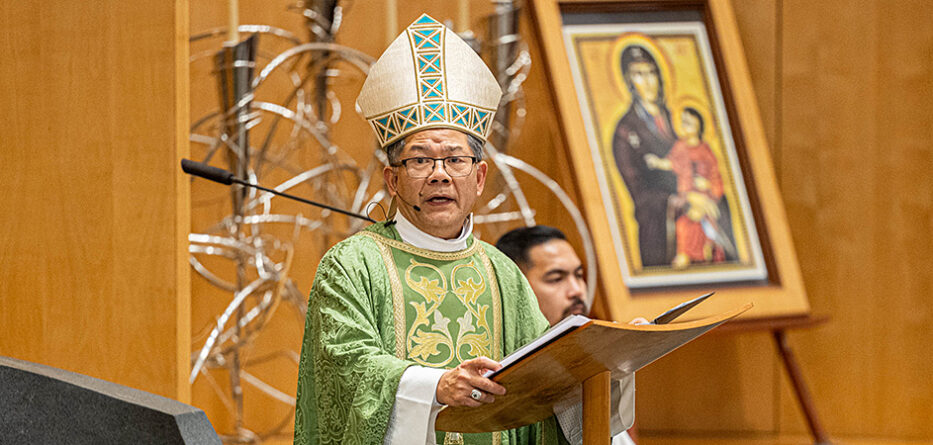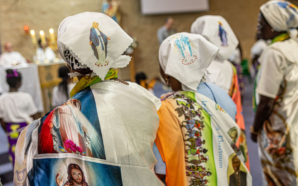Most Reverend Vincent Long Van Nguyen OFM Conv DD STL, Bishop of Parramatta
Homily for the 14th Sunday in Ordinary Time, Year B
Readings: Ezekiel 2:2-5; 2Corinthians 12:7-10; Mark 6:1-6.
7 July 2024
Persevere on the journey of healing, truth, justice and reconciliation
Dear sisters and brothers,
One of the hardest hurts that we have to endure is the feeling of being misunderstood, rejected and betrayed by your own family, community or society. Many years ago, I went back to my native village for the first time. I had hoped to be able to celebrate Mass with fellow parishioners. However, I was denied the opportunity by the authorities who considered me a persona non-grata, because I had spoken out on human rights issues in the communist ruled country.
Today marks the first NAIDOC week since the failed Referendum. For many of our Aboriginal and Torres Strait Islander communities, there is certainly a sense of devastation, grief and even disenfranchisement. How can we move forward on a journey towards truth, justice and reconciliation? Surely, it is the work of the Church to lift up the downtrodden and empower those who are disadvantaged.
Scriptures on this 14th Sunday speak of the courage and determination to persevere in such enterprise. It is a kind of commitment that obliges us to walk not the path of popularity but to negotiate the hard road of integrity, truth and solidarity with the voiceless and forgotten. At the end of the day, a Christian discipleship that does not lead us to the place of suffering with victims of injustice is at best questionable and at worst a betrayal of the Gospel.
In the first reading, Ezekiel was called to deliver some hard home truths to the people of Israel. It was a tumultuous time. The Jewish monarchy had declined, and the nation had fractured. The ruling elites had no concern for the poor, but instead manipulated the political chaos to their advantage. It was in this abysmal situation that Ezekiel spoke God’s word of comfort to the afflicted but affliction to the comfortable. He challenged the power that be as “a set of rebels” for failing the vulnerable. His defence of truth, justice and integrity was as unpopular then as it is unpopular now.
Like Ezekiel, Jesus was not exactly the poster boy in his hometown. Instead of a hero welcome, he was given the short shrift. Not only here but throughout the New Testament, the theme of rejection is undeniably prevalent. It is best summarised in the opening words of John’s Gospel “He came to his own and his own did not receive him.” Unfortunately, this has been used as a pretext for antisemitism. The truth is that the prophet is unwelcome for his message that challenges the status quo.
Jesus had ministered with great success to the outsiders beyond Jewish territory. He had healed a demoniac, a foreigner, the daughter of Jairus and the woman with chronic disease. The God he preached did not look down on the socially marginalised, the ritually unclean or the morally inferior. Indeed, it was the tax collectors, the lepers, the blind, the lame etc… who were the beneficiaries of God’s unstinting goodness and love. Thus, Jesus was rejected for preaching a dangerous message to those who claimed special treatment on account of their social standing, wealth, influence, entitlements and privileges.
In God’s kingdom, the outsiders can become insiders and the insiders can end up being outside. It is all a matter of our attitude and disposition. God does not look at appearances but the heart. He does not judge us according to our gender, race, rank, seniority, longevity, religion or kindred. He does not operate out of the merit-based system of this world. He subverts our narrow confines and stereotypes. Instead, as Jesus consistently demonstrated, it is our humble, faithful and life-giving discipleship that matters. It is our commitment to walk with our brothers and sisters the journey to the fulness of God’s kingdom.
Dear friends,
Jesus like Ezekiel was not one who shirked from the existential risk of being the teller of truth. Indeed, suffering was the constant feature of his life. It was interwoven into every word he spoke and every action he performed. The rejection he endured in his hometown was only a precursor to the ultimate rejection on the cross. Yet Jesus was not deterred. He was more committed than ever to the work of the kingdom. If we are his true disciples, we must not shirk either from the inherent risk of discipleship.
Christian discipleship demands our moral courage, integrity and fidelity. Christians are to participate in the divine project of reconciling and restoring all things in Christ. We do so by our willingness to confront situations of injustice or conflict without compromising the Gospel and without counting the cost to oneself. It is our commitment to the truth of the Gospel even at the hazard of incurring the ridicule or rejection of others.
Pope John Paul II long ago said that Australia will not be fully itself until the contribution of our indigenous people is joyfully received, acknowledged and celebrated. On this NAIDOC week, let us renew our commitment to follow Jesus’ example in doing the work of healing, justice, restoration and reconciliation. Like him, let us not be deterred by the lack of success or by rejection but persevere on the journey to the fulness of God’s kingdom.








